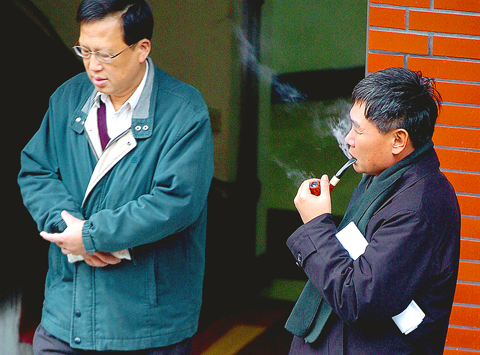On the second day since the new anti-tobacco regulation came into force, health officials yesterday continued issuing tickets to violators, mostly business owners who provided ashtrays or failed to display no-smoking signs.
As of yesterday, health officials in 25 counties and cities had inspected more than 10,760 establishments and issued more than 65 tickets for violations of the Tobacco Hazard Prevention and Control Act (菸害防制法), said Chao Kun-yu (趙坤郁), deputy director general of the Bureau of Health Promotion.
The first wave of inspections focused mainly on smoking in public places, he said. Most violations involved business owners who provided ashtrays or smoking-related paraphernalia, or who failed to display no-smoking signs that meet the requirements stipulated in the regulation.

PHOTO: LIAO CHEN-HUEI, TAIPEI TIMES
Many people, however, disputed what they saw as “gray areas” in the regulation, such as certain public outdoor areas that are “completely smoke-free” as stipulated in the regulation. Some people complained they did not know open areas outside hospitals were considered smoke-free zones, while others were confused about whether they could smoke in temples, as most temples are open spaces that are filled with smoke from burning incense.
Hsiao Mei-ling (蕭美玲), director general of the bureau, said at a press conference yesterday that smoking would be prohibited within 10m of operating facilities in public spaces that are completely off-limits to smoking, as stipulated in Article 15 of the Act. This would include areas such as hospitals, train and bus stations, school campuses, government agencies, post offices, banks, offices with three or more people, performance halls, movie theaters, hotels, shopping malls and most restaurants.
“Large shopping areas or supermarkets are off-limits [to smoking] because they qualify as indoor working areas with three or more people,” Hsiao said.
The Act “does not apply to mall shops with one or two employees, such as local shops and family-owned beauty parlors,” she said.
Temples have also escaped the various categories of smoke-free spaces listed in Articles 15 and 16 of the Act, meaning that smoking is still allowed, she said.
The bureau will issue official notices to all major hospitals and clinics to provide clarification on the new Act, as well as to the Ministry of Transportation and Communications for distribution to all transportation-related facilities.
The bureau’s interpretation of the Act drew criticism from anti-smoking group the John Tung Foundation.
Yau Sea-wain (姚思遠), president of the foundation and dean of Chinese Culture University’s College of Law, slammed the bureau for what he said was a misinterpretation of the law and ignoring the intent of the Act.
“If the space in question has different smoking regulations depending on whether the smoker is indoors or outdoors, then the law would clearly state this,” said Yau.
Smoking is prohibited at bus and train stations as well as hospitals — indoors or outdoors — as clearly stated in the Act, he said.
Small local shops and family-owned beauty parlors qualify as public spaces, as stated in Article 15 Item 13 of the Act, so it is not a question of whether three or more people work there, as the bureau stated, he said.
“Doesn’t the bureau categorize ‘temples’ as a public space? They are, as are shops and beauty parlors,” he said.
“The bureau’s hasty interpretation has weakened the carefully written law,” he said.

A preclearance service to facilitate entry for people traveling to select airports in Japan would be available from Thursday next week to Feb. 25 at Taiwan Taoyuan International Airport, Taoyuan International Airport Corp (TIAC) said on Tuesday. The service was first made available to Taiwanese travelers throughout the winter vacation of 2024 and during the Lunar New Year holiday. In addition to flights to the Japanese cities of Hakodate, Asahikawa, Akita, Sendai, Niigata, Okayama, Takamatsu, Kumamoto and Kagoshima, the service would be available to travelers to Kobe and Oita. The service can be accessed by passengers of 15 flight routes operated by

Chinese spouse and influencer Guan Guan’s (關關) residency permit has been revoked for repeatedly posting pro-China videos that threaten national security, the National Immigration Agency confirmed today. Guan Guan has said many controversial statements in her videos posted to Douyin (抖音), including “the red flag will soon be painted all over Taiwan” and “Taiwan is an inseparable part of China,” and expressing hope for expedited reunification. The agency last year received multiple reports alleging that Guan Guan had advocated for armed reunification. After verifying the reports, the agency last month issued a notice requiring her to appear and explain her actions. Guan

GIVE AND TAKE: Blood demand continues to rise each year, while fewer young donors are available due to the nation’s falling birthrate, a doctor said Blood donors can redeem points earned from donations to obtain limited edition Formosan black bear travel mugs, the Kaohsiung Blood Center said yesterday, as it announced a goal of stocking 20,000 units of blood prior to the Lunar New Year. The last month of the lunar year is National Blood Donation Month, when local centers seek to stockpile blood for use during the Lunar New Year holiday. The blood demand in southern Taiwan — including Tainan and Kaohsiung, as well as Chiayi, Pingtung, Penghu and Taitung counties — is about 2,000 units per day, the center said. The donation campaign aims to boost

The Central Weather Administration (CWA) said a magnitude 4.9 earthquake that struck off the coast of eastern Taiwan yesterday was an independent event and part of a stress-adjustment process. The earthquake occurred at 4:47pm, with its epicenter at sea about 45.4km south of Yilan County Hall at a depth of 5.9km, the CWA said. The quake's intensity, which gauges the actual effects of a temblor, was highest in several townships in Yilan and neighboring Hualien County, where it measured 4 on Taiwan's seven-tier intensity scale, the CWA said. Lin Po-yu (林柏佑), a division chief at the CWA's Seismological Center, told a news conference